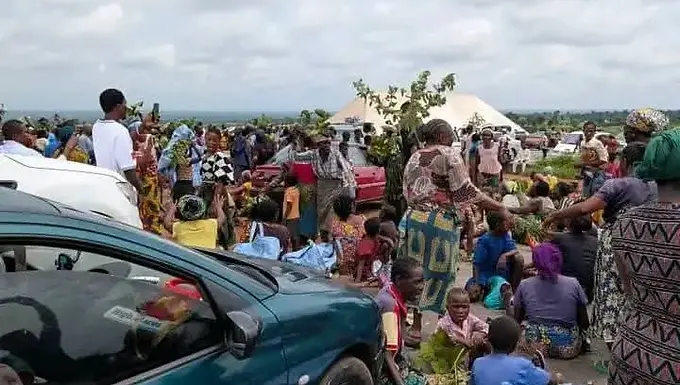
Nigeria Team Report: August 9th, 2025

Protestors block highway. Photo by Olikita Ekani.
In mid-June 2025, the community of Yelewata in Benue State’s Guma Local Government Area became the site of one of the deadliest attacks recorded in the region that year. Armed men, widely believed to be Fulani militants, launched a night time assault on the Christian farming village, targeting civilians as they slept. Survivors reported that the attackers used automatic weapons and set fire to homes, food stores, and a local market. The destruction was widespread, and bodies were left either burned or riddled with bullets. Death toll estimates vary significantly—while the Benue State government initially reported 59 fatalities, multiple human rights groups, religious organizations, and journalists placed the number of dead between 100 and 200.
The violence forced the immediate displacement of over 3,900 people from Yelewata alone, adding to an already dire humanitarian crisis in Benue State, where more than 500,000 internally displaced persons (IDPs) had been recorded by the middle of 2025. Most of the displaced were Christians from rural farming communities who had already suffered from similar attacks in previous months. These survivors fled to IDP camps in and around Makurdi, including Ichwa, Abagana, Daudu, and Mgbatir. Conditions in the camps were extremely poor shelters were overcrowded, food supplies were insufficient, clean water was scarce, and there was minimal access to healthcare. In the month following the Yelewata attack, at least eight people died in two of the camps, and a 19-month-old child named Terseer Aondowase David was reported kidnapped and remained missing.
On July 30, 2025, hundreds of displaced persons, mostly women and children, staged a protest by blocking the Makurdi–Lafia–Abuja highway. Their demonstration was peaceful but desperate. They held leaves and signs and demanded to return to their homes. Their slogans were direct: “We want to go back home. No security, no food.” The protest came just one day after the First Lady of Nigeria had announced a ₦1 billion donation to support IDPs. Protesters, however, said they had not received any aid and had no trust that the funds would reach them. Local leaders echoed these concerns and accused both state and federal authorities of failing to act decisively in the face of repeated massacres.
Security forces were heavily criticized in the aftermath of the Yelewata killings. According to residents, soldiers and police had been stationed within a short distance of the village during the attack, but did not respond. Youth leader Damian Ugbir and community elder Thomas Ukumba both alleged that the security personnel either ignored warnings or chose not to intervene. Many locals suspected complicity or at least deliberate inaction. The Inspector General of Police later announced that 26 suspects had been arrested in connection with the Yelewata attack. These arrests were part of a broader operation in which 53 suspects were detained across Benue and neighbouring Plateau State. Authorities also recovered automatic weapons, including AK-47s and machine guns.
President Bola Tinubu visited Makurdi weeks after the massacre, where he issued a formal condemnation of the killings and ordered security reinforcements. However, his failure to visit the Yelewata community itself drew criticism. Human rights organizations, including Amnesty International and Human Rights Watch, expressed concern about the federal government’s delayed and inconsistent response to what they identified as targeted violence against a religious and ethnic group. Several groups within Nigeria and abroad have referred to the violence as ethnic cleansing, or even genocide, citing the pattern of attacks on predominantly Christian farming communities across Benue and other parts of the Middle Belt.
The situation remains unresolved. Thousands of displaced people continue to live in squalid conditions without security or support. Many say they are afraid to return to their ancestral lands because the attackers remain free, and there are no guarantees of protection. For the survivors of Yelewata and other affected communities, justice remains elusive, and the future uncertain.